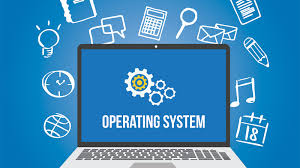info@gladsme.in
+91.8891968718
The Evolution and Importance of Operating Systems in Modern Computing
The Evolution and Importance of Operating Systems in Modern Computing

In the realm of computing, the operating system (OS) is a critical component that bridges the gap between hardware and software. It is the backbone that ensures the smooth functioning of a computer, enabling users to execute applications efficiently. Over the years, operating systems have evolved significantly, adapting to the changing needs of technology and users. This blog explores the history, development, and significance of operating systems in modern computing.
A Brief History of Operating Systems
The journey of operating systems began in the early days of computers. The first generation of OS, in the 1950s, consisted of simple batch processing systems. These systems were designed to execute a series of jobs without human intervention. By the 1960s, the advent of multiprogramming allowed multiple processes to run concurrently, significantly improving efficiency.
The 1970s saw the development of UNIX, which became a cornerstone for many modern operating systems. UNIX introduced the concept of portability, allowing it to be used across different hardware platforms. The 1980s and 1990s marked the rise of graphical user interfaces (GUIs), with operating systems like Windows and macOS making computers more user-friendly and accessible to the general public.
Key Components of an Operating System
An operating system consists of several core components that manage different aspects of a computer's functionality:
Kernel: The core part of the OS, responsible for managing system resources, including CPU, memory, and I/O devices.
File System: Organizes and manages data storage, allowing users to store, retrieve, and manipulate files.
User Interface: Provides the means for users to interact with the computer, either through command-line interfaces (CLI) or graphical user interfaces (GUI).
Device Drivers: Facilitate communication between the OS and hardware devices, ensuring they function correctly.
System Utilities: A collection of programs that perform specific tasks to maintain the computer system, such as disk cleanup and antivirus.
The Role of Operating Systems in Modern Computing
Today, operating systems are more sophisticated and versatile than ever before. They play a crucial role in various domains, including:
Desktop and Laptops: Operating systems like Windows, macOS, and Linux power millions of personal computers worldwide, providing a platform for productivity, entertainment, and communication.
Servers: Server operating systems, such as Linux, Windows Server, and UNIX, are designed to handle high workloads, ensuring reliability, security, and efficient resource management in data centers and enterprise environments.
Mobile Devices: Mobile operating systems like Android and iOS dominate the smartphone and tablet markets, offering a wide range of applications and services tailored to mobile users.
Embedded Systems: Operating systems are also embedded in various devices, from smart TVs and wearables to industrial machines and automotive systems, enabling functionality and connectivity.
The Future of Operating Systems
As technology continues to advance, operating systems are expected to evolve further. The rise of artificial intelligence, machine learning, and the Internet of Things (IoT) will likely drive the development of more intelligent, adaptive, and secure operating systems. These future OS will need to manage increasingly complex environments, ensuring seamless integration and interaction between a vast array of devices and services.
Operating systems are the unsung heroes of modern computing, providing the foundation upon which applications and hardware operate harmoniously. From their humble beginnings to their current sophisticated state, OS have continually adapted to meet the demands of users and technology. As we move forward, the evolution of operating systems will undoubtedly play a pivotal role in shaping the future of computing.
Related Blogs

The Importance of Data Structures in Software Development
Read More...
Exploring Machine Learning Algorithms: A Beginner's Guide
Read More...
The Evolution of Programming Languages: From Assembly to Rust
Read More...
Understanding Big O Notation: A Guide for Developers
Read More...Subscribe for our Newsletter
Subscribe to elevate your software game! Stay updated on the latest trends, coding insights, and exclusive promotions with our newsletter.
